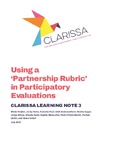Using a ‘Partnership Rubric’ in Participatory Evaluations
| dc.contributor.author | Snijder, Mieke | |
| dc.contributor.author | Hicks, Jacky | |
| dc.contributor.author | Paul, Sukanta | |
| dc.contributor.author | Arulanantham, Amit | |
| dc.contributor.author | Apgar, Marina | |
| dc.contributor.author | Afroze, Jiniya | |
| dc.contributor.author | Karki, Shanta | |
| dc.contributor.author | Mareschal, Sophie | |
| dc.contributor.author | Prieto Martín, Pedro | |
| dc.contributor.author | Uddin, Forhad | |
| dc.contributor.author | Veitch, Helen | |
| dc.date.accessioned | 2023-07-13T10:20:02Z | |
| dc.date.available | 2023-07-13T10:20:02Z | |
| dc.date.issued | 2023-07-12 | |
| dc.identifier.citation | Snijder et al. (2023) Using a ‘Partnership Rubric’ in Participatory Evaluations, CLARISSA Learning Note 3, Brighton: Institute of Development Studies, DOI: 10.19088/CLARISSA.2023.001 | en |
| dc.identifier.uri | https://opendocs.ids.ac.uk/opendocs/handle/20.500.12413/18051 | |
| dc.description.abstract | Programmes that aim to tackle complex societal issues, such as the worst forms of child labour, require rich partnerships that bring together different perspectives. CLARISSA’s consortium partnership adopts an empowerment approach to the interventions we deliver and our ways of working together. Part of this approach involves ongoing reflection and learning about how we work together in our partnership, and how this can be adapted if needed. This learning note focuses on a method used in CLARISSA to both reflect on and strengthen how we work in partnerships – the partnership rubric. We found that using the rubric flexibly was key to mitigating some of the challenges of such a complex consortium. This included using it in different sizes of forum, with different levels of preparation. Periodically adapting it for country context and as new partners came on board also helped ensure a shared sense of our preferred ways of working as the project progressed. | en |
| dc.description.sponsorship | Foreign, Commonwealth & Development Office | en |
| dc.language.iso | en | en |
| dc.publisher | Institute of Development Studies | en |
| dc.relation.ispartofseries | CLARISSA Learning Note;3 | |
| dc.rights | This is an Open Access paper distributed under the terms of the Creative Commons Attribution 4.0 International licence (CC BY), which permits unrestricted use, distribution, and reproduction in any medium, provided the original authors and source are credited and any modifications or adaptations are indicated. | en |
| dc.rights.uri | http://creativecommons.org/licenses/by/4.0/ | en |
| dc.subject | Participation | en |
| dc.title | Using a ‘Partnership Rubric’ in Participatory Evaluations | en |
| dc.type | Series paper (IDS) | en |
| dc.rights.holder | Institute of Development Studies | en |
| dc.identifier.team | Power and Popular Politics | en |
| dc.identifier.doi | 10.19088/CLARISSA.2023.001 | |
| dcterms.dateAccepted | 2023-07-12 | |
| rioxxterms.funder | Default funder | en |
| rioxxterms.identifier.project | Default project | en |
| rioxxterms.version | VoR | en |
| rioxxterms.versionofrecord | 10.19088/CLARISSA.2023.001 | en |
| rioxxterms.funder.project | 43db2a26-ab53-4dd1-873f-cff26a51d1e0 | en |
Files in this item
This item appears in the following Collection(s)
-
Child Labour [51]
Except where otherwise noted, this item's license is described as This is an Open Access paper distributed under the terms of the Creative Commons Attribution 4.0 International licence (CC BY), which permits unrestricted use, distribution, and reproduction in any medium, provided the original authors and source are credited and any modifications or adaptations are indicated.


